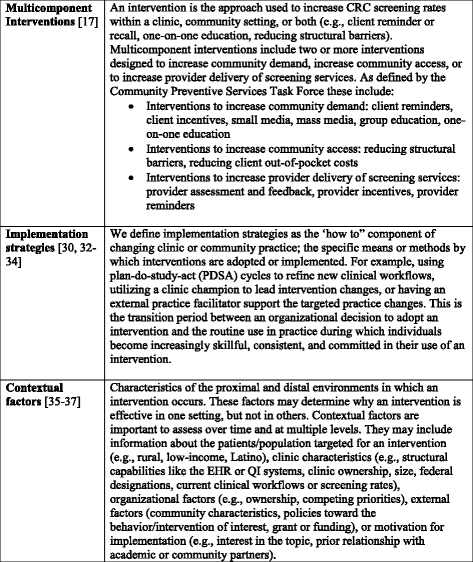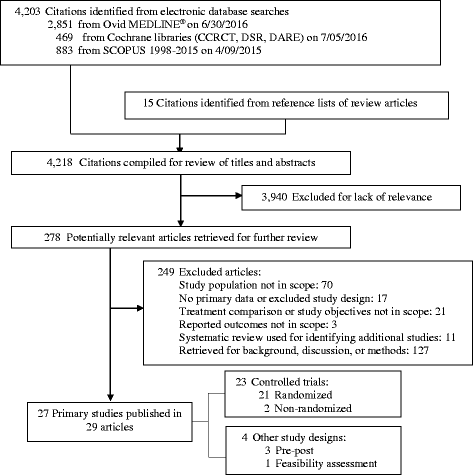A systematic review of clinic and community intervention to increase fecal testing for colorectal cancer in rural and low-income populations in the United States - How, what and when?
- PMID: 29304835
- PMCID: PMC5756384
- DOI: 10.1186/s12885-017-3813-4
A systematic review of clinic and community intervention to increase fecal testing for colorectal cancer in rural and low-income populations in the United States - How, what and when?
Abstract
Background: Interventions to improve fecal testing for colorectal cancer (CRC) exist, but are not yet routine practice. We conducted this systematic review to determine how implementation strategies and contextual factors influenced the uptake of interventions to increase Fecal Immunochemical Tests (FIT) and Fecal Occult Blood Testing (FOBT) for CRC in rural and low-income populations in the United States.
Methods: We searched Medline and the Cochrane Library from January 1998 through July 2016, and Scopus and clinicaltrials.gov through March 2015, for original articles of interventions to increase fecal testing for CRC. Two reviewers independently screened abstracts, reviewed full-text articles, extracted data and performed quality assessments. A qualitative synthesis described the relationship between changes in fecal testing rates for CRC, intervention components, implementation strategies, and contextual factors. A technical expert panel of primary care professionals, health system leaders, and academicians guided this work.
Results: Of 4218 citations initially identified, 27 unique studies reported in 29 publications met inclusion criteria. Studies were conducted in primary care (n = 20, 74.1%), community (n = 5, 18.5%), or both (n = 2, 7.4%) settings. All studies (n = 27, 100.0%) described multicomponent interventions. In clinic based studies, components that occurred most frequently among the highly effective/effective study arms were provision of kits by direct mail, use of a pre-addressed stamped envelope, client reminders, and provider ordered in-clinic distribution. Interventions were delivered by clinic staff/community members (n = 10, 37.0%), research staff (n = 6, 22.2%), both (n = 10, 37.0%), or it was unclear (n = 1, 3.7%). Over half of the studies lacked information on training or monitoring intervention fidelity (n = 15, 55.6%).
Conclusions: Studies to improve FIT/FOBT in rural and low-income populations utilized multicomponent interventions. The provision of kits through the mail, use of pre-addressed stamped envelopes, client reminders and in-clinic distribution appeared most frequently in the highly effective/effective clinic-based study arms. Few studies described contextual factors or implementation strategies. More robust application of guidelines to support reporting on methods to select, adapt and implement interventions can help end users determine not just which interventions work to improve CRC screening, but which interventions would work best in their setting given specific patient populations, clinical settings, and community characteristics.
Trial registration: In accordance with PRISMA guidelines, our systematic review protocol was registered with PROSPERO, the international prospective register of systematic reviews, on April 16, 2015 (registration number CRD42015019557 ).
Keywords: Colorectal cancer; Fecal testing; Implementation science; Rural; Systematic review; Vulnerable populations.
Conflict of interest statement
Authors’ information
No additional information provided.
Ethics approval and consent to participate
Not applicable.
Consent for publication
Not applicable.
Competing interests
The authors declare that they have no competing interests.
Publisher’s Note
Springer Nature remains neutral with regard to jurisdictional claims in published maps and institutional affiliations.
Figures
References
-
- Cancer Facts & Figures 2017. [https://www.cancer.org/content/dam/cancer-org/research/cancer-facts-and-...] Accessed Nov 14 2017.
-
- US Preventive Services Task Force. Final Update Summary: Colorectal Cancer: Screening. U.S. Preventive Services Task Force. June 2016. https://www.uspreventiveservicestaskforce.org/Page/Document/UpdateSummar.... Accessed Nov 14 2017.
-
- American Cancer Society . Colorectal Cancer Facts & Figures 2014–2016. Vol. 2014. Atlanta: American Cancer Society; 2014.
Publication types
MeSH terms
Grants and funding
LinkOut - more resources
Full Text Sources
Other Literature Sources
Medical
Miscellaneous



